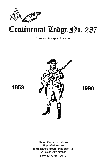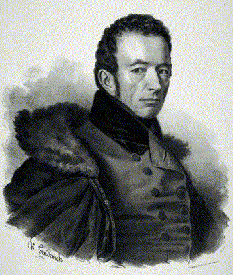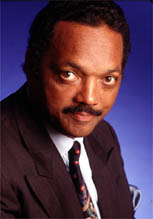|


Welcome
to Continental Lodge #287's Home Page. We Fraternally invite you to
view our Communication and visit us on our regular meeting night. We
meet on the first Wednesday of the month at Grand Lodge, 71 West 23rd
Street in the Renaissance Room on the 6th Floor at 7:30PM. Our
Brothers meet for dinner prior to the meetings. Check the
Communication for location and feel free to join us..... Dutch of
course!!
Be Well, God Bless and let our Brotherly Love Spread Around the
World!!!
 |
|

 |
Sign Our GuestBook
View Our GuestBook |
| If you are not already a member
of our ancient & honorable fraternity, and would like additional
information, please contact this Lodg or any of our fraternity.
Although we cannot directly solicit members, we will be pleased to
respond to your interest by answering your questions and will gladly
provide a petition at your request. |
|


| |
 Home Home
| Joel
R Poinsett
One of the most controversial episodes in Mexican history involves Freemasonry and the
first American minister to Mexico, who was Joel R. Poinsett (1779-1851). He is more recalled today
for the Christmas flower which he brought back from his stay and which is named after him
than for his stormy years as a diplomat. Charleston aristocrat (although opposed to
slavery) and inveterate traveler, Poinsett first went to Mexico at the request of
President Monroe in the summer of 1822. There he met and formed an unfavorable opinion of
the Emperor Iturbide, an army officer (and Scottish Rite Mason) who had set himself up in
considerable style as ruler (self-proclaimed) in the wake of the overthrow of the Spanish. who was Joel R. Poinsett (1779-1851). He is more recalled today
for the Christmas flower which he brought back from his stay and which is named after him
than for his stormy years as a diplomat. Charleston aristocrat (although opposed to
slavery) and inveterate traveler, Poinsett first went to Mexico at the request of
President Monroe in the summer of 1822. There he met and formed an unfavorable opinion of
the Emperor Iturbide, an army officer (and Scottish Rite Mason) who had set himself up in
considerable style as ruler (self-proclaimed) in the wake of the overthrow of the Spanish.
There is no evidence to show that Poinsett had any reason to be predisposed to dislike
Iturbide, and the principle of Occam's Razor should be applied: the philosophic doctrine
that entities and causes should not be multiplied unnecessarily. Rather than fabricate
reasons, we can (unless evidence surfaces to the contrary), observe that Iturbide was not
a very likable individual and that Poinsett was annoyed by the pretentiousness of the
court that the would-be emperor had created.
This was only the initial encounter in Poinsett's involvement with Mexico, a
relationship which had profound consequences for the country but which it is easy to
misread. While it is true that later when he was America's envoy, Poinsett was to have a
unique opportunity to make his views felt, there is nothing to substantiate claims that he
was part of a Masonic cabal which sent him to Mexico with a secret agenda. Return
To Last Page |
| Joseph
Fort Newton
Dr Joseph Fort Newton was a clergymanand Masonic author. He lived from 1880until 1950.
Bro. Newton was raised inFriendship Lodge #7, Dixon, Illinois later affiliating with Mt.
Hermon Lodge #263,Cedar Rapids, lowa. He is the author of oneof Freemasonry 's classics,
The Builders Return to Last Page |
| Jesse
Jackson

Jesse Louis Jackson, President of the National Rainbow Coalition, is one of America's
foremost political figures. Over the past three decades he has played a major role in
virtually every movement for empowerment, peace, civil rights, gender equality, and
economic and social justice.Reverend Jackson has been called the "conscience of the
nation" and "the great unifier," challenging America to establish just and
humane priorities, and bringing people together on common ground across lines of race,
class, gender, and belief.
Years before they were common positions, Reverend Jackson was advocating national
health care, a war on drugs, dialogue with the Soviet Union, and negotiations in the
Middle East. His strong stand against apartheid in South Africa in 1984 mad it an issue on
the national conscience.Jesse Jackson's two presidential campaigns broke new ground in
U.S. politics. His 1984 campaign won 3.5 million votes, registered over a million new
voters, and helped the Democratic Party regain control of the Senate in 1986.
His 1988 candidacy won seven million votes and registered two million new voters.
Reverend Jackson won a historic victory, coming in first or second in 46 out of 54
contest. His clear progressive agenda and his ability to build an unprecedented coalition
inspired millions to join the political process.As a highly respected world leader, Jesse
Jackson has acted many times as an international diplomat in sensitive situations. In 1984
Reverend Jackson secured the release of captured Navy Lieutenant Robert Goodman from
Syria, as well as the release of 48 Cuban and Cuban-American prisoners in 1987.
He was the first American to bring hostages out of Kuwait and Iraq in 1990.In 1990, in
an impressive victory, Jesse Jackson was elected to the post of U.S. Senator from
Washington, D.C., a position also known as "Statehood Shadow Senator." The
office was created to advocate for statehood for Washington, D.C.. The District of
Columbia, with a population higher than five states, has no voting representation in
Congress.A hallmark of Reverend Jackon's work has been his commitment to the youth. He has
visited thousands of high schools, colleges, and universities, encouraging excellence, and
challenging your people to stay in school and away from drugs. Jesse Jackson has also been
a major force in the American labor movement. He has worked with unions to organize
workers, mediated labor disputes and he has probably walked more picket lines and spoken
at more labor rallies than any other national leader.
A hallmark of Reverend Jackson's work has been his commitment to youth. He has visited
thousands of elementary schools, high schools, colleges, and universities, encouraging
excellence and urging young people to stay away from drugs. He has visited prisons,
bringing comfort to the abandoned and discouraging recidivism.Reverend Jackson has
received numerous honors for his work in human rights and social justice. In 1991, the
U.S. Post Office put his likeness on a pictorial postal cancellation, only the second
living person to receive such an honor. He has been on the Gallup List of Ten Men Most
Respected by Americans for ten years. He has also received the prestigious NAACP Springarn
Award. Reverend Jackson has been awarded over 40 honorary degrees.Jesse Louis Jackson was
born on October 8, 1941 in Greenville, South Carolina.
He attended the University of Illinois on a football scholarship and transferred to
North Carolina A&T State University. He attended the Chicago Theological Seminary
until he joined the civil rights movement full time in 1965.Reverend Jackson began his
activism as a student leader in the sit-in movement and continued as a young organizer in
the Southern Christian Leadership Conference as an assistant to Dr. Martin Luther King,
Jr. He went on to direct Operation Breadbasket and subsequently founded Operation PUSH in
Chicago, organizations of economic empowerment aimed at expanding educational and economic
opportunities for disadvantaged and minority communities.In 1986, Jesse Jackson founded
the National Rainbow Coalition of which he is President.
The Rainbow is a national social justice organization devoted to empowerment, education
and mobilization. Reverend Jackson is also the author of two books: Keep Hope Alive (South
End Press) and Straight from the Heart (Fortress press, 1987)Jesse Jackson married
Jacqueline Lavinia Brown in 1963. They have five children: Sanitita Jackson, Congressman
Jesse Louis Jackson, Jr., Jonathan Jackson, Yusef DuBois Jackson, and Jacqueline Lavinia
Jackson. The Jackson reside in Washington, D.C.
|
| Geoffrey Francis Fisher
English churchman, the 99th archbishop of Canterbury. He became
archbishop of Canterbury in 1945. Fisher was a distinguished pastor and administrator,
helping to reorganize the work of the Church of England after World War II (1939-1945). As
president of the World Council of Churches from 1946 to 1954, he was a vigorous proponent
of the ecumenical movement. Fisher visited Pope John XXIII, becoming the first archbishop
of Canterbury to visit the Vatican since 1397. Return
to Last Page |
| Father
Francisco Calvo
The original idea of founding of Freemasonry in Costa Rica, came from a trip made by
Dr. Father Francisco Calvo to Peru., Where he met some priests who were Masons, and
through the instigation of these priests he was initiated into the Order. On his return to
Costa Rica, together with other Masons already residents, he established Lodge Caridad No.
26, which was granted a Charter on June 28,1865, by the Grand Orient of New Granada. Since
its foundation until the present day, Freemasonry has numbered among its members many
conspicuous personages of the country and priests of irreproachable character; among the
latter may be mentioned the illustrious, charitable and much beloved Rev. Dr. Carlos M.
Ulloa and Father Francisco Calvo, 33".
The Supreme Council of Central America, which is located in San Jose, Costa Rica, was
founded on January 9, 1871, under a Charter granted by the Supreme Council of New Granada,
to the Ill. Bro. Rev. Dr. Francisco Calvo,33", dated November 27,1870,
which empowered him to created the Grand Orient and the Supreme Council of Central
America, in the city of
San Jose.
This Supreme Council was allowed to be taken temporally to the City of Guatemala, under
the condition that it be returned seven years later.
Return
to Last Page |
| Reverend
William Booth
On April 9,1865, Lee met Grant in the parlor of a private home at Appomattox Court
House. He surrendered his army and brought an end to four long years of
death and devastation called the Civil War. In the same year a 36 year old Englishman by
the name of William Booth declared war on the powers of darkness by founding the Salvation
Army. army and brought an end to four long years of
death and devastation called the Civil War. In the same year a 36 year old Englishman by
the name of William Booth declared war on the powers of darkness by founding the Salvation
Army.
One of the most effective weapons in General Booth's arsenal was fervent prayer. It was
not unusual for Booth to hold "an all night of prayer" when he came to preach
the Word of God. People would flood the altars every where he went. "The power of God
was wonderfully manifest in the meetings . . . people were frequently, struck down,
overwhelmed with a sense of
the presence and power of God."
The Salvation Army's success at freeing the captives was uncanny, especially when one
considers those who it strived to reach. General Booth's battle cry was "Go for souls
and go for the worst." The worst of sinners were saved, saloons were closed and
entire cities were shaken.
Booth's success attracted not only supporters but also enemies. Those who served in the
Army were pelted with hot coals, sprayed with tar and burning sulphur, beat, stoned and
even kicked to death in the streets. The Salvation Army resisted their enemies with a
cheerful "God bless you", and a prayer. General Booth, himself was often in the
thick of it. When spit on during the Midlands tour, Booth encouraged his fellow soldiers,
"Don't rub it off - it's a medal!"
Night after night Booth would come home bleeding and bruised after being attacked for
preaching in the slums of England. After such nights of testing he would take his wife's
hand and say, "Kate, let me pray with you." After praying with Catherine he
would rise from his knees armed with fresh courage and hope. Booth needed all the valor
his wife Catherine could inspire
in him. She encouraged him, "if we get tired we had better go and be done with,
anything is better than a dead church." Despite the grinding pressures of the
ministry the Booths had a happily united family. The General had nine children and loved
to play and romp with them, especially in their favorite game of "Fox and
Geese."
Once while traveling, General Booth's car was detained. He took advantage of the
opportunity and exhorted some idle factory workers. He said, "some of you men never
pray, you gave up praying long ago. But I'm going to say to you, won't you pray for your
children that they may be different?" Within minutes 700 men knelt in silent prayer.
At another time, two Salvation Army officers set out to found a new work, only to meet
with failure and opposition. Frustrated and tired they appealed to the General to close
the rescue mission. General Booth sent back a telegram with two words on it, "TRY
TEARS." They followed his advice and they witnessed a mighty revival.
During the course of William Booths ministry he traveled 5,000,000 miles and preached
60,000 sermons. God help us in this desperate and distracted day in which we live to heed
the General's advice. "Work as if everything depended upon your work, and pray as if
everything depended upon your prayer." Return
to Last Page |
|
Richard Allen,the founder and first Bishop of the African Methodist
Episcopal Church, was born a slave on February 14, 1760
on the Benjamin Chew estate. Deeply religious from an early, age, Allen was converted at
the age of 17. He began preaching in 1780 and was ordained in 1799. Through thrift and
industry, he and his brother worked at night to pay for their freedom. 1760
on the Benjamin Chew estate. Deeply religious from an early, age, Allen was converted at
the age of 17. He began preaching in 1780 and was ordained in 1799. Through thrift and
industry, he and his brother worked at night to pay for their freedom.
Despite his lack of formal medical training, Allen was a noted "Bleeder", the
equivalent of our present day surgeons. Dr. Benjamin Rush, a leading physician of the time
and one of the signers of the Declaration of Independence, gave praise to Bishop Allen for
his services during the Black Plague in 1793 which took the lives of thousands of
Philadelphians.
In 1791 Allen established what was known as the Blacksmith Shop Meeting House when he
purchased an abandoned blacksmith shop forma man named Sims and moved it to a plot of
ground on 6th Street between Lombard and Pine Streets. This building was dedicated as a
church in 1794 by Bishop Francis A. Asbury of the Methodist Episcopal Church.
From July 1805, Allen conducted services in the "Roughcast Church". This had
been the first brick church erected on American soil by people of color. The African
Methodist Episcopal denomination was organized in Philadelphia in 1816. Richard Allen was
consecrated as its first Bishop at the General Conference in Philadelphia, Pennsylvania,
April 10, 1816. In 1841 the red brick church was built to replace the old roughcast one,
and remained in use until the present church (dedicated in 1890) was erected in its place
on the original plot of ground.
Allen was an organizer of the Free African Society, a group that fostered self-help and
self-dependence. He established day and night schools, and was co-organizer of the first
Masonic Lodge among colored men in Pennsylvania, African Lodge 459 in Philadelphia.
From 1797 to his death on March 26, 1831, Allen operated a station on the Underground
Railway for escaping slaves. This work was continued by Bethel Church until the
Emancipation.
Bishop Allen was married to Sarah Bass Allen. He was the father of six children-
Richard Jr., James, John, Peter, Sarah and Ann. |
Return To Home Page
|
